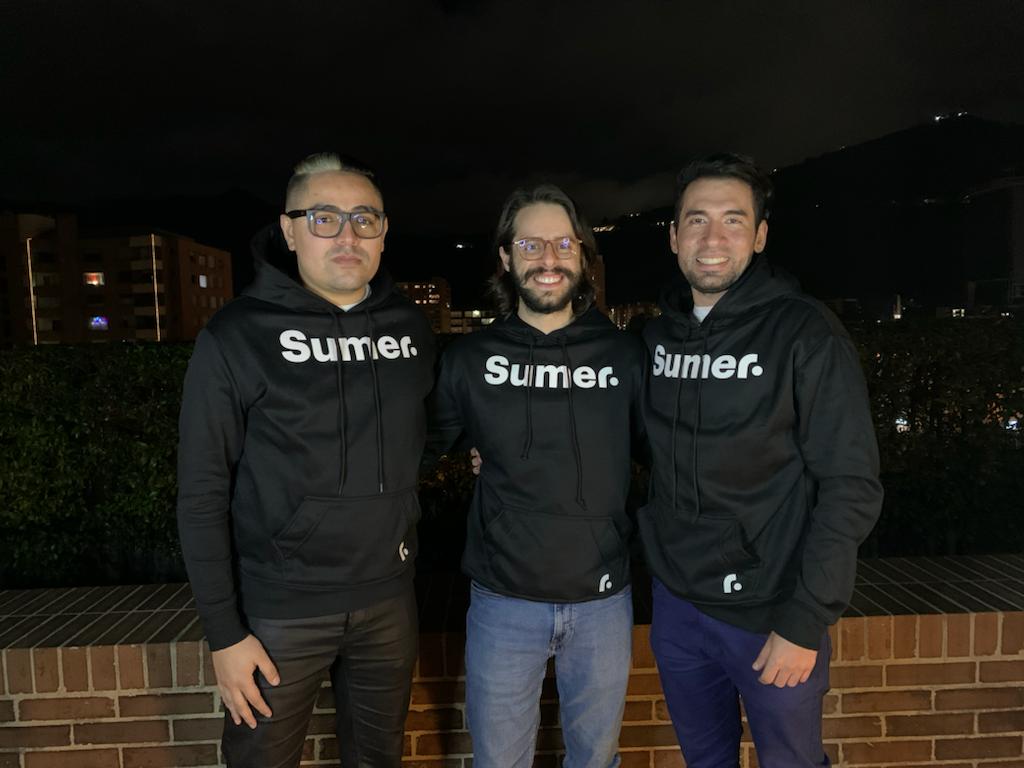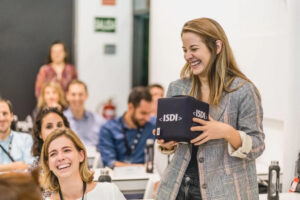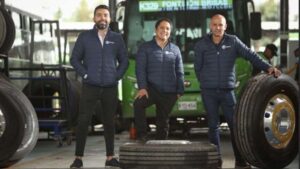
Por Paola Villarreal
enero 19, 2022
Yerson Cacua, Óscar Arellano, and Joaquín Serrano all worked at Rappi, the Colombian delivery giant, before creating their own company called Sumer.
Sumer has a different approach to the Colombian unicorn; it seeks to help small and medium-sized companies (SMEs) successfully migrate to e-commerce. They do this by supporting them with income and expense management, advertising, and processing orders and payment methods.
However, what the Sumer founders learned at Rappi is also visible in how they have built their startup and how they’re planning to grow it.
The e-commerce market for SMEs is promising. In Latin America, 88.4% of companies are micro and 9.6% are small, according to data shared by the Business Council of the Pacific Alliance (CEAP). But only 45% of them survive their first two years. Threatened by the lack of institutional processes and by digitization, many of them find it difficult to break this cycle.
Meanwhile, the digital sector is seeing unprecedented growth. It is estimated that in 2021, e-commerce in Latam closed US$80.5 billion in retail sales and is expected to reach more than US$105.5 billion by 2025, according to Statista.
Given this scenario, Sumer has identified taking SMEs to e-commerce not only as a business opportunity, but also to contribute to the growth of local economies.
Less than a month after starting operations, the startup carried out a pre-seed raising of US$2 million. Among their investors were Susa Ventures, 8VC, Marathon Ventures and Broom Ventures. Their angel investors are Cacua, Arellano and Serrano’s former colleagues: Felipe Villamarín, Simón Borrero and Sebastián Mejía, who are the founders of Rappi.
To learn more about this new proposal in the digital ecosystem of Latam, as well as what it means to graduate from one of the great regional unicorns and become an entrepreneur, we spoke with Cacua and Serrano in this interview with Sumer for Contxto.
CONTXTO (C): What is Sumer, and why does it promise to create online stores in less than 15 seconds?
Joaquín Serrano (JS): What we are looking for is to create a super app for SMEs. The emphasis we have on 15 seconds responds to the need presented by many entrepreneurs who seek to create their online store because they want to sell more and generate income faster.
We are not inventing the wheel, but we want to improve the adoption of technology in two ways:
C: In what places do you currently operate? And, which ones do you seek to cover in the future?
Yerson Cacua (YC): We are in 15 Latin American countries, but we are very focused on Mexico and Colombia. Basically 60% of our users are in these two countries. They began to look for us a lot in Central America and also the Hispanic market in the United States has asked us to open there.
Since we started operations, we already have 1.4 million products loaded into our system. Daily we are uploading approximately 42,000 products. It is a very simple process that has attracted more and more people.
CONTXTO (C): Being a free platform for the user: how does it become a business for you?
JS: The idea is that we are the main acquisition channel used by SMEs. We start monetizing the moment our users are generating profits.
Right now our goal is to accompany businesses from their earliest stage, when purchasing power is not representative. Once the business is consolidated and grows, its needs change and it demands other types of services. It is then that we will offer services for which we can charge a percentage.
However, they receive basic functions like store/catalog creation, promotions, account management. These are all are 100% free to use and download.
CONTXTO (C): What has been the most difficult thing for you as entrepreneurs when raising capital?
JS: Right now, LatAm is experiencing unprecedented times. The market is very willing to place investment thanks to regional success stories such as Rappi and Nubank. They have paved a beautiful path for all the next wave of entrepreneurs to come.
The difficult thing is that there is a lot of silver on the market, but what entrepreneurs need is to choose quality silver. We have had a lot of support from the co-founders of Rappi, and the Rappi Mafia concept has helped a lot as we have been fortunate that we could choose our investors.
YC: Coming from a startup like Rappi taught us in an accelerated way to know how to choose and trace the path correctly. Those lessons made it easy for us to reach the heart and soul of an investor. They are not skills that are organic or natural, and having been part of a startup really helped us with that.
CONTXTO (C): Startups have become like universities for future startups. But there are many who are against the fact that the new founders are known with the title of «ex – company to which they belonged»
In your experience: How has it been to have been part of a startup like Rappi and now have your own one?
YC: What you say is interesting. On the one hand, Oscar and I have been at Rappi since day 0. Joaquín arrived for series A. When we were there, we were approximately 12 people. Now that we’ve left, there were 3,500 of us, so it makes me very proud to have been a part of Rappi.
In fact, I hope people don’t leave that company so much and continue building this giant, which has been a pioneer for investors to turn and look at Latin America. There is a giant thank you to Rappi in this regard, and I understood it the moment I got out of there: I saw how much we built and how much we had achieved. It was like watching a child grow up.
In my opinion, if entrepreneurs put «I am ex Rappi, ex Nubank, ex Uber» on their LinkedIn profiles, it is a great tool to demonstrate what they have achieved and from which institutions they come. It’s just like putting the title of YC’16, YC’20, etc.
JS: This entrepreneurial ecosystem is being nurtured thanks to what startups like Nubank, Rappi or Kavak have achieved. Everything is simpler for us thanks to the efforts of these great ones.
Saying that I am ex Rappi is like saying that I am very good at doing things quickly in the most entrepreneurial sense. It is something that very few companies have achieved. For example, initially Elon Musk did say that he had formerly worked at PayPal. If Sumer, Frubana, Tributi and others are coming out of Rappi, it is something that has to be shouted out loud.
You may also be interested in: Palenca, an employment data platform, raises $2.6 million

Por Stiven Cartagena
septiembre 11, 2025

Por Contxto
mayo 31, 2024

Por Contxto
mayo 23, 2024